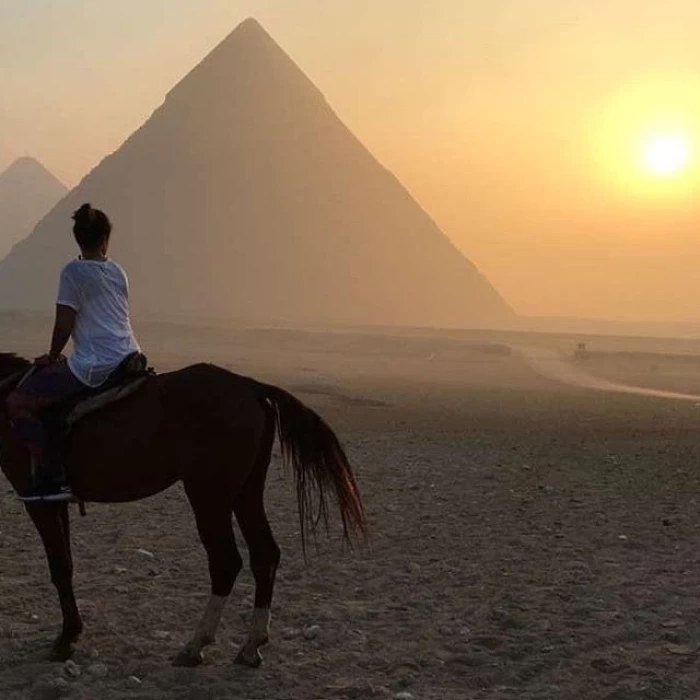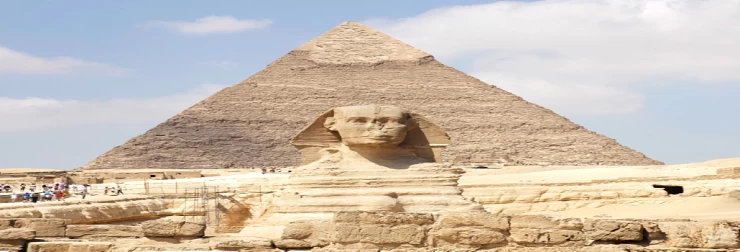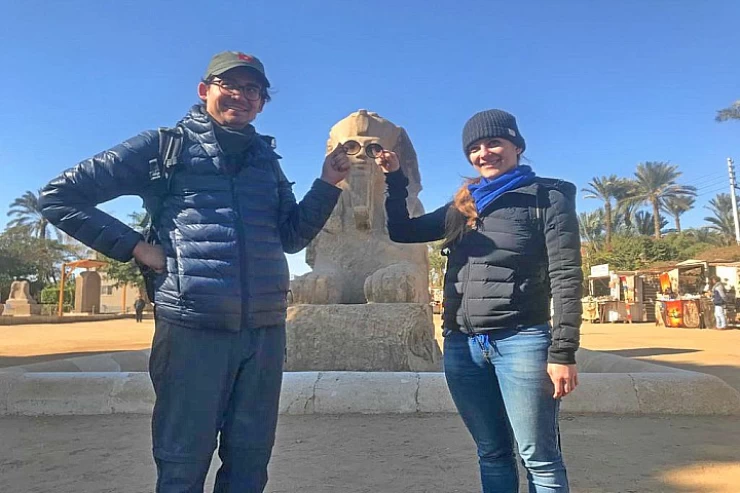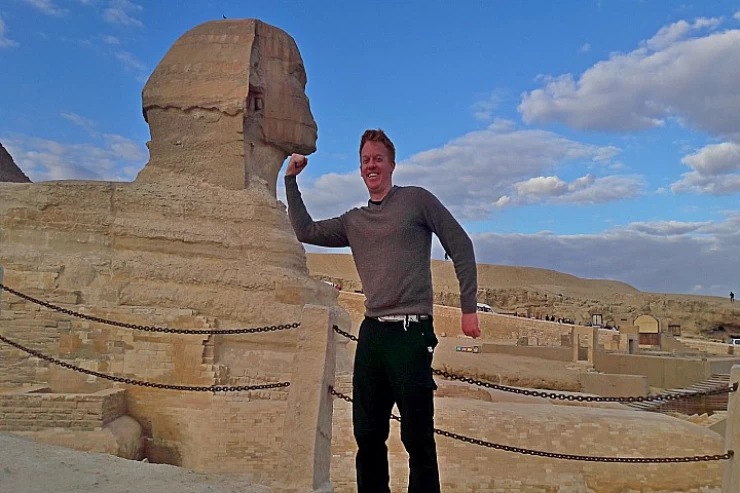
History of Egypt | Timeline of Egyptian history
Detailed History of Egypt
Ancient Egypt (c. 3100 BCE – 332 BCE)
**1. Early Dynastic Period (c. 3100 – 2686 BCE)**
- **Unification:** King Narmer (Menes) unified Upper and Lower Egypt around 3100 BCE, establishing the first dynasty.
- **Writing System:** Development of hieroglyphics, the Egyptian script for religious texts and official inscriptions.
**2. Old Kingdom (c. 2686 – 2181 BCE)**
- **The Age of Pyramids:** Pharaohs built monumental pyramids, including the Great Pyramid of Giza (c. 2580 BCE) under Khufu.
- **Divine Kingship:** Pharaohs were viewed as gods, with centralized power and elaborate burial customs to ensure a safe passage to the afterlife.
**3. First Intermediate Period (c. 2181 – 2055 BCE)**
- **Political Fragmentation:** A period marked by regional rivalries and the rise of local governors (nomarchs).
- **Civil Strife:** Internal conflicts weakened the central authority.
**4. Middle Kingdom (c. 2055 – 1650 BCE)**
- **Reunification:** Pharaoh Mentuhotep II restored stability and reunified Egypt.
- **Cultural Advancements:** Flourishing literature, arts, and construction of temples and fortifications.
**5. Second Intermediate Period (c. 1650 – 1550 BCE)**
- **Hyksos Rule:** Foreign invaders established control, introducing new technologies such as the horse and chariot.
- **Cultural Exchange:** Despite foreign rule, there was a blending of cultures.
**6. New Kingdom (c. 1550 – 1070 BCE)**
- **Empire Expansion:** Pharaohs expanded territory into Nubia and the Levant, making Egypt a dominant regional power.
- **Notable Pharaohs:**
- **Hatshepsut:** One of the few female pharaohs; known for trade expeditions.
- **Akhenaten:** Introduced monotheism with worship of Aten; known for revolutionary changes in art and religion.
- **Tutankhamun:** Restored traditional polytheism; his tomb discovery in 1922 revealed rich artifacts.
- **Ramses II:** Known as Ramses the Great; famed for military prowess and monumental architecture, including Abu Simbel.
**7. Third Intermediate Period (c. 1070 – 664 BCE)**
- **Decline of Central Power:** Fragmentation into competing states, with significant foreign influence from Libyans and Nubians.
#### Greco-Roman Period (332 BCE – 395 CE)
**8. Macedonian Conquest (332 BCE)**
- **Alexander the Great:** Conquered Egypt, hailed as a liberator; founded Alexandria, which became a major center of learning and culture.
**9. Ptolemaic Dynasty (332 – 30 BCE)**
- **Cultural Syncretism:** A blend of Greek and Egyptian traditions; the Ptolemies adopted pharaonic titles and practices.
- **Cleopatra VII:** The last Ptolemaic ruler; her alliances with Julius Caesar and Mark Antony are notable events in history.
**10. Roman Egypt (30 BCE – 395 CE)**
- **Annexation:** After Cleopatra's death, Egypt became a province of Rome, vital for its grain production.
- **Cultural Influence:** Continued blend of Greek and Egyptian cultures, with Alexandria remaining a key intellectual center.
#### Islamic Period (7th Century – 1517)
**11. Arab Conquest (642 CE)**
- **Islamization:** The conquest by Muslim armies led to the rapid spread of Islam and Arabic culture throughout Egypt.
**12. Fatimid and Ayyubid Periods**
- **Cairo's Foundation:** Cairo was established in 969 CE as the capital of the Fatimid Caliphate, becoming a hub for Islamic scholarship.
#### Ottoman Period (1517 – 1798)
**13. Ottoman Rule**
- **Integration into the Empire:** Egypt became an important province within the Ottoman Empire, with local governors exerting significant control while reporting to the sultan.
#### Modern Egypt (19th Century – Present)
**14. Muhammad Ali Era (1805 – 1848)**
- **Modernization Efforts:** Muhammad Ali introduced extensive reforms in military, education, and agriculture, laying the groundwork for a modern state.
**15. British Occupation (1882 – 1952)**
- **Colonial Control:** Egypt was effectively under British control, leading to widespread nationalistic movements and demands for independence.
**16. Independence and Revolution (1952)**
- **Gamal Abdel Nasser:** Led the revolution that overthrew the monarchy, establishing a republic and promoting Arab nationalism and socialism.
**17. Contemporary Egypt**
- **Political Turmoil:** The Arab Spring in 2011 led to significant protests, the ousting of President Hosni Mubarak, and ongoing political instability.
- **Recent Developments:** The rise of Abdel Fattah el-Sisi and his government has seen a mix of economic reforms and controversial political crackdowns.
Egypt's history is a tapestry of triumphs, cultural exchanges, and profound transformations, leaving a lasting legacy that continues to influence the modern world. Its journey from ancient civilization to contemporary state highlights the resilience and complexity of its people and culture.
The ancient history that can be perceived from the Pharaohs has to be one of the greatest historical civilizations ever. Its events’ timeline is well over five thousand years, and many aspects of the world, such as art, architecture, culture, and even religion, have their bases in Egypt. The records of the land of Egypt are interesting in that they contain histories of empires that were built and then perished, histories of great kings and queens, and outstanding places and structures that even today, in modern societies, can only marvel at. Egypt’s history is undoubtedly dominated by a vibrant narrative of struggle, hope, and ingenuity of the people portrayed, from the making of the pyramids to the currents of the Nile.
The Ancient Kingdoms of Egypt (c. 3100 BC–332 BC)
1. Pre-Dynastic Period (Before 3100 BC)
The elements of history written of Egypt are dated around 3100 BC, but if one avails of its importance in terms of history, it dates back even to the pre-dynastic era, when there was the emergence of small agricultural settlements along the Nile. By this time, the early residents of Egypt were busy establishing forms of agriculture as well as animal husbandry, pottery making, and the making of crude tools. These settlements served as the foundation of the elaborate systems of culture and society that were to come.
2. The Unification and Early Dynastic Period (c. 3100–2686 BC)
King Narmer, often referred to as Menes was responsible for the unification of Upper and Lower Egypt, which signified the onset of ancient Egyptian civilization. He is considered to be the first pharaoh of Egypt and founded the nation’s first dynasty. This unifying act was essential since it created the nucleus around which the centralized monarchy of Egypt, which was the prevailing system of government for almost three thousand years, would revolve.
Towards the tail end of the Early Dynastic, the very first steps in the construction of monumental architecture began, and hieroglyphs were mastered. It was in this period that the rulers were expected to fulfill the role of the king and also that of a god. This idea existed for many years and was a fundamental one in Egypt.
3. The Old Kingdom (c. 2686–2181 BC)
The divine rulers, who were the Pharaohs in the earthly realm, tamed every resource and manpower to erect huge structures such as the Great Pyramid of Khufu and the Sphinx.
The Old Kingdom period displayed a clear and consistent administrative hierarchy and even a large-scale institutional support system that controlled the resources, agricultural production, and the temples of the state. However, in the latter years of this era, the dominant position of the central authority began to diminish, ushering in an era of chaos and fragmentation.
4. The Middle Kingdom (c. 2055–1650 BC)
Following the tumultuous First Intermediate Period referred to, Egypt returned to political stability and strong rulers in its Middle Kingdom. There is a revival in this period in the fields of art, literature, and monumental building works. Pharaohs such as Mentuhotep 11 and Senusret 111 were responsible for extending Egypt’s boundaries southward into Nubia as well as promoting relations with other countries through trade.
The Middle Kingdom is usually regarded as the classical period of ancient Egypt, filled with relative calm and wealth. The authorities emphasized the development of construction and the growth of the economy of Egypt. In spite of such achievements, the internal conflicts and external challenges finally caused the disintegration of the Middle Kingdom, making way for another period of darkness and despair.
5. The New Kingdom (c. 1550–1070 BC)
The new kingdom constitutes, also from a chronological point of view, the culminating era of ancient Egyptian civilization. It was during this period that Egypt was transformed into a full-fledged empire under rulers such as Thutmose III, Hatusu, and Rameses II, who through wars and conquests, or rather political strategies, expanded Egypt's borders. He also added great temples during this period, such as those at Karnak, Luxor, and Abu Simbel, many of which still exist today.
Il nuovo regno era un’epoca che riformò anche la religione in notevoli modi, come il periodo di regno del faraone Akhenaten, which introduced a period of continuous fight in worshipping a single god—Aten, the disk of the sun. His was, however, an unpopular and a very brief rule, for there were leaders after him who brought back the old ways of worship in Egypt, which was worshiping none but many gods.
But then, power aside, Egypt was not immune to the laws of history. By the close of the New Kingdom, this state institution in question was already wobbly, and there was a gradual abatement of its activities.
1. The Ptolemaic Dynasty (332–30 BC)
For many centuries, the old state of Egypt thrived free until that point in time, which altered when the rule of Alexander the Great started in the year 332 BC. It was also during those years that Alexandria became the center of Greek civilization and education, with the noted Library of Alexandria and the Lighthouse, which is now one of the Seven Wonders of the Ancient World.
Until the end of the dynasty, the traditions of Egypt were largely maintained, even though the rulers were Hellenistic kings. The last ruler of this dynasty, Cleopatra VII, was known to have opposed the domination of Rome by trying to establish relations with Julius Caesar and Mark Antony. However, after her loss at the Battle of Actium in 31 BC, Egypt fell into the Roman Empire.
Under the control of the Romans, Egypt was considered one of the most valuable provinces of the empire, primarily because it was rich and produced plenty of crops, particularly grains. The Romans maintained several of the practices of the Ptolemaic kings; however, Egypt was administered as a colony of the empire. The establishment of Christianity in Egypt started during the Roman times, and it was in the 4th century A.D. that Egypt began to develop into a significant early center of Christianity.
The phase change from the Roman to the Byzantine Empire that occurred in 395 AD marked the slow deterioration of Egypt’s economic well-being, but Egypt was still geographically and religiously active. It was also in this time period that the popular Coptic Church was born, which incorporated aspects of Christianity with ancient Egyptian beliefs.
The Egyptian territories fell to the Army of Islam in the year 642 AD. This marked the commencement of the Islamic Era in Egypt. As Cairo, a city created by the Fatimids in 969 AD, grew prominent, it was clear that Egypt was going to become one of the most pivotal countries in the Islamic world. After most of the Egyptian lands were conquered, Egypt witnessed great prosperity in learning, trade, and the arts.
The Fatimids, Ayyubids, and Mamluks
The capital of Egypt was established, and the famous Al-Azhar University was built during the reign of the Fatimid Dynasty which ruled over Egypt. With the waning of the Fatimid era, Egypt was captured for a brief period by the fact that Saladin, protector of the territories, including Egypt himself, later founded the Ayyubid dynasty, whose main task was fighting against the Crusaders.
Later came the Mamluks, who were a military caste and who ruled over Egypt for several eras. They built a number of the most beautiful structures in the city, including mosques, schools, and fortifications, in the Mamluk period. Egypt was, at least at the stage when it was defeated, a rather big country with advanced development before it was conquered by the Ottoman Empire.
Egypt in the Modern Era (1517–Present)
1. Ottoman and British Rule
With the Ottoman Empire's conquest in 1517, Egypt was annexed as part of the empire for nearly four hundred years and had remained so bound. That is primarily due to its geopolitical possibilities; it was invaded several times by European powers, and in 1798 Napoleon Bonaparte managed to invade Egypt for a short period. After the French lost in this region, Egypt was ruled by Muhammad Ali Pasha, who was on modern Egypt’s compass. He reformed agriculture, industry, and the military; these transformations served as the waking up of the modern state of Egypt.
In the late nineteenth century, Egypt acquired the status of a British protectorate, which lasted until ’52, the year Egypt resumed control after a revolution led by Gamal Abdel Nasser. It was Nasser who became one of the most powerful figures within the Arab sphere of influence, propagating pan-Arabism and earlier nationalizing the Suez Canal in 1956.


















